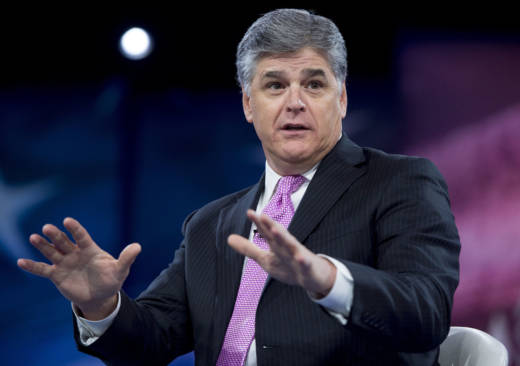At that, Hannity excelled. But Santa Barbara wasn’t impressed. According to Robinson, at the time a host of KCSB’s “Third World News Review,” listeners quickly started to complain that Hannity’s call-in talk show, “The Pursuit of Happiness,” was racist, sexist and homophobic.
In excerpts of one broadcast from April 4, 1989, Hannity and an anti-gay activist trade inflammatory smears about gay men and homosexual sex.
Hannity calls homosexuals “disgusting people” full of “hatred and bigotry and anti-sexual heterophobia.” When Jody May (now Jody May-Chang), the lesbian host of another KCSB show, called in to comment, Hannity and his guest insulted her — and her newborn son — with a vulgar crack about artificial insemination.
Robinson said that, for the station’s governing board, the attack on a fellow host was the last straw. KCSB fired Hannity that June, just weeks before the start of the next academic quarter, when he would have had to apply for renewal under the student-run station’s rules.
But Hannity wasn’t going to go without a fight. Robinson recalled Hannity trying to physically force his way into the studio when she and other hosts were on air countering his claims. He was repelled by students who held him back with a strategically placed cabinet, she said.
Soon after, Hannity contacted the Santa Barbara chapter of the American Civil Liberties Union (ACLU), asking for help defending his right to free speech.
“We had to thrash it out,” said Stewart Holden, a Santa Barbara attorney on the ACLU’s local chapter board. “But … even those who were most passionate and most focused on gay rights, we all agreed that this was a First Amendment issue.”
UC Santa Barbara is a public institution, and so sacking Hannity for his views amounted to suppression of free speech.
Ironically, Holden said, UCSB could have avoided a First Amendment case entirely had they fired Hannity for his behavior, rather than for his show’s content. But in the event, Holden took the case for the ACLU, and went back to the university, demanding Hannity’s show be reinstated.
He won.
Hannity could have gone back on the Santa Barbara airwaves — but he had other plans. He turned down the offer of a new show, and riding on the publicity from the controversy, soon landed a paid gig at Alabama’s conservative WVNN radio. The rest is history. Hired by Fox News in 1996, Hannity has become one of U.S. media’s most influential and controversial pundits, with an average 3.2 million viewers a night.
“Do I wish he weren’t there? Probably,” Robinson said. “Am I amused, however, when I’m covering a convention when I hear Sean shouting at me saying ‘Hey, hey, how are you?’ Although he never remembers my name, which is OK.”
But she sees Hannity’s tip of the hat to KCSB for launching his career as a “left-handed compliment.”
“He credits us for that – or discredits us, as the case may be,” she said.
Holden is no Hannity fan, but he describes himself as a “free speech purist” and said he’s proud of his work on the case.
“You know, it’s very easy to be principled when your principles are aligned with your preferences and where the speech that you’re defending is something you agree with,” he said.
“It’s a lot harder when it’s speech that you don’t agree with. I’m proud of our chapter for supporting Mr. Hannity, despite the fact that nobody on the chapter board liked what he had to say in this show.”
As for Hannity, he doesn’t deny or defend the statements that got him fired from KCSB in 1989. But he now says they do not reflect his views.
In a statement distributed by Fox News, Hannity recalled the incident.
“Almost 30 years ago when I was starting out in radio in my 20’s, I interviewed a controversial guest who made several incendiary comments. I was young and stupid with no clue how to do a show. I’m actually very libertarian on social issues and people’s personal lives … and yes I freely admit the comments in my 20s were ignorant and embarrassing.”

